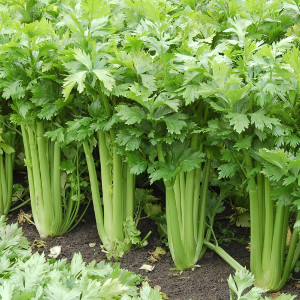You don’t hear much about it these days – not in the mainstream media, anyway – but there was a big splash of ‘news’ coverage a few years ago about the many beneficial effects of celery for your oral health. Was all the hullabaloo real, or was it a clever hoax?
 Even this Silverback Mountain Gorilla knows the importance of good dental hygiene…
Even this Silverback Mountain Gorilla knows the importance of good dental hygiene…
Less than a year ago, a dental clinic posted on its website a professional opinion – conditional as it may be – about the efficacy of celery as a toothbrush:
“We wouldn’t recommend you swapping out your toothbrush for a stalk of celery – but yes, crunchy vegetables such as carrots, cauliflower, broccoli and cucumbers help clean teeth and gums because of the increased chewing it takes to break them down. They are natural abrasives and eating them scrubs your teeth in a natural and harmless way. Leafy greens [also] contain calcium and folic acid which are good for teeth and gums.”
No comment, here, on the claims about carrots, cauliflower, broccoli and cucumbers. But I was gratified and relieved to find a professional endorsement of celery as a ‘natural toothbrush’.
A longtime believer
I’ve been a believer in celery for quite a while, now – since they stopped selling ‘firm’ toothbrushes. Look at the obvious advantages:
- Tough, stringy fibres that run the length of the stake. Just like dental floss!
- Rough, bristly cut (or bitten) ends which an be rubbed up and down on teeth to scrape off the tartar and plaque.
- Just eating the stuff – chewing it well before swallowing – can reach all surfaces of your teeth with scrubbing action.
- Scrubbing ‘bristle’ action is effective but gentle – less chance of making gums bleed or irritating sensitive gums.
- Sugar free! Some toothpastes are still sweetened with nutritive (sugary) substances.
- Also offers dietary benefits: High in calcium and folic acid, which are good for teeth and gums. Also a good source of vitamins A and C
Other benefits, lower down
There is also a massive online presence for ‘Celery Nature’s Toothbrush for your Colon’. You’ll find that out the first time you Google ‘celery toothbrush’. Apparently the fibres are indigestible and, passing through your lower reaches in much the same condition as they entered your system, provide a great cleanse.
Not really relevant to our topic today, but noteworthy as an additional potential benefit of eating celery.
Alas, no big rush to the produce department
So why didn’t the dentally aware masses rush to the produce department to stock up on celery?
I’m no conspiracy theorist, but I have had some experience in the boardrooms of the manufacturing sector, and I know how product makers react to demands from shareholders to keep improving the returns on their investments. I’ve long suspected that firm toothbrushes were discontinued because medium- and (especially) soft-bristled ones break down and become useless much faster – within a few weeks of popping them out of the bubble pack. And you have to go out and buy new ones more frequently.
Think they’d miss the opportunity to discourage the idea, if they could, that celery could do the job and provide vitamins and minerals? The popular chatter about the celery toothbrush died a fast and quiet death. And the dental profession helped, by pooh-poohing the idea.
Be that as it may
I’ve always favoured firm toothbrushes because they actually get the gunk out from between and around my teeth, while lesser bristles just slide over the deposits. But I’ve also hated firm brushes because they irritate my gums and make them bleed. In my estimation, celery does just as good a job as a firm toothbrush without the drawbacks.
And, last but not least, let’s not forget that this versatile veggie is a key member of French cuisine’s aromatic triumvirate: Mirepois, the basis of many a classic flavour profile. Try that with toothpaste… Or not.
~ Maggie J.

